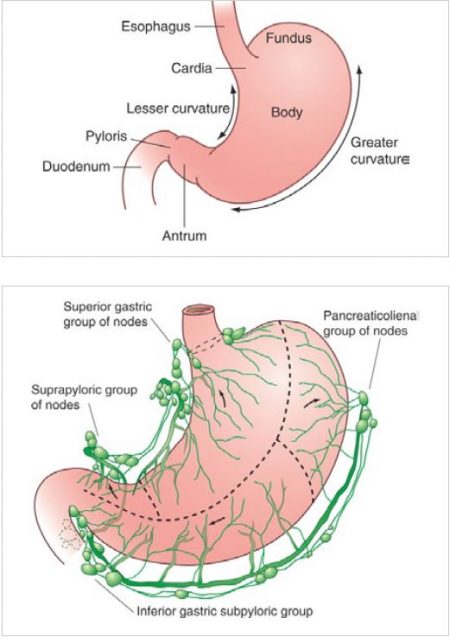WHAT IS THE STOMACH CANCER?
The Stomach is located in our upper abdomen and is part of our digestive system. It connects the esophagus (gullet) with the small intestine. It acts as a food reservoir, mixes the food ingested and secretes liquid substances that aid digestion. Stomach cancer usually occurs when cells in the inner layer of the stomach wall grow and divide without stopping. Overtime, these cells will form lumps called tumors and the cancer may invade into the stomach wall and spread in others parts of the body (metastasis)
RISK FACTORS
- Family history of stomach cancer
- A history of Helicobacter Pylori infection
- A diet high in salty and smoked foods
- A diet low in fruits and vegetables
- Smoking
- Hard drinkers
People who think they may be at risk should discuss this with their doctor.
WHAT ARE THE SIGNS AND SYMPTOM
Early stomach cancer may not show any noticeable signs or symptoms. Below are some symptoms of stomach cancer (although they may be caused by other conditions as well):
- Upper abdominal or ‘gastric’ pain
- Frequent indigestion
- Black stool
- Nausea and vomiting
- Anemia
- Loss of appetite and/ or weight
You should consult a doctor if any of the symptoms above are present. Stomach cancer is curable if detected early.
WHAT CAN YOU DO TO PREVENT STOMACH CANCER?
There are two ways that may prevent stomach cancer:
- Avoid diets that are high in salt, smoked, overdrink or pickled foods
- Choose a diet high in fresh fruits, vegetables and whole grain foods
HOW IS STOMACH CANCER DIAGNOSED?
- Endoscopy: Your doctor uses an endoscope (a flexible tube with a miniature camera attached to the end) to look directly inside the stomach. This is inserted through the mouth into the stomach. The test will take about 15 minutes and it is not painful. Sedation can be given during the test if necessary.
- During the procedure, the doctor can take small samples of the tissue (biopsy) to be examined by an Histopathologist.
- If a cancer is found, the next step is to run other tests such as a CT scan to find out whether it has spread to other organs.
WHAT ARE THE TREATMENT OPTIONS?
There are different treatments available for stomach cancer depending on the stage, the position of the cancer and your overall health. The three main types of treatment include surgery, radiation and chemotherapy.
Surgery
Surgery is the most important treatment for stomach cancer in the early stages (when cancer is confined to the stomach). The most common treatment is called gastrectomy. There are two types:
- Partial Gastrectomy: the removal of part of the stomach. The remaining portion of the stomach is then reconnected to the small intestine.
- Total Gastrectomy: the removal of the entire stomach. The intestine is then reconnected directly to the esophagus.

The lymph glands (nodes) close to the stomach will also be removed during the surgery to achieve the best outcomes.
Partial Gastrectomy
Lower portion of stomach is removed
Total Gastrectomy
Gullet reconnected to small intestine Stomach is removed
If the cancer is too bulky to be removed, a connection can be made between the stomach and small intestine (gastrojejunostomy). This will relieve the symptoms but will not cure the cancer.
Food intake after Surgery
Digestion is mainly performed by our small intestine. The stomach is just a reservoir. Hence, patients can still live and eat normally after gastric surgery. However, appetite may be reduced after surgery. We recommend patients to have small and frequent meals after surgery. Nutritional advice will be given.
Chemotherapy
Chemotherapy is the use of drugs to help kill cancer cells and shrink the size of the tumor. It can be given alone or in combination with radiotherapy before or after surgery. It is also the choice of treatment if the patient is not suitable for surgery.
The drug can be given as injection through a vein. Nowadays, some chemotherapy drug can be given orally as tablets. One the drugs enter the blood stream, they spread throughout the body. Multiple chemotherapy sessions are usually required. A combination of drugs are usually used together.
Radiation Therapy
Radiation therapy uses high energy x-rays or other types of radiation to kill cancer cells or to prevent them from growing. Hospital stay may not be required. The way the radiation therapy given depends on the type and stage of the cancer being treated.
Radiation is usually administrated after surgery together with chemotherapy to kill very small remnants of the cancer that cannot be seen and removed during the surgery. Radiation therapy can also be used to ease the symptoms of advanced cancer.
Need any help?
Please talk to your doctor or nursed if you have any further concerns. Our team in FV Hospital will try our best to help you.
(Information in this brochure is given as a guide only and does not replace medial advice from your doctor. Please seek advice from your doctor if you have question related to the surgery, your health or medical consultation).

 Vi
Vi 












